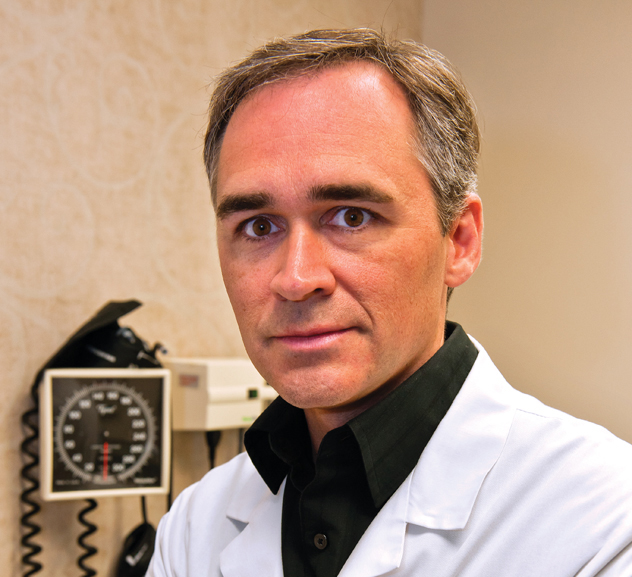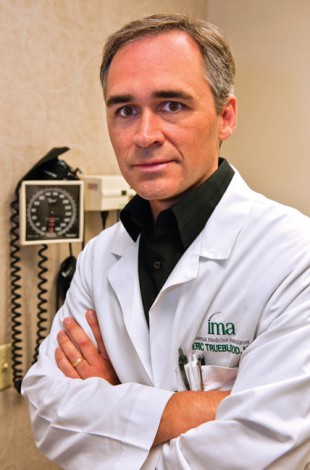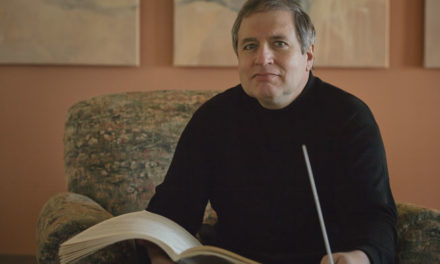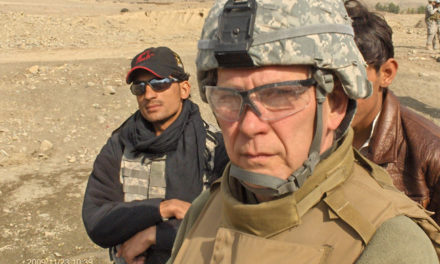BY ELISABETH ANDREWS
Picture this: You’re in the desert outside Kandahar, Afghanistan, with nothing around you but a flimsy tent and a giant fuel bladder that serves as a red-hot target for enemy rockets. Suddenly a Humvee rolls up in a cloud of dust, depositing a soldier who has just lost half his pelvis in a grenade blast. It’s your job to keep him alive on a 17-hour journey to the hospital—and you need to do it in the back of a cargo airplane, in pitch-black darkness, through a twirling combat takeoff that requires you to strap yourself to the canvas stretcher as you scramble to set up a blood transfusion using only the scant supplies in your backpack.
For Bloomington pulmonologist Dr. Eric Trueblood, that was a standard workday in the U.S. Air Force.
“You just move aside the bullets and beans and try to set up your ICU in the space of ten minutes,” he recalls. “Everything’s shaking, your medicines are either freezing or boiling, and you’re hoping that someone doesn’t shoot a surface-to-air missile and take you out.”
As part of a three-person Critical Care Air Transport Team that also included a nurse and respiratory technician, Trueblood, 41, was responsible for moving the most-critically wounded patients out of the combat zone to a location where they could receive state-of-the-art care. On his three deployments—first to the Persian Gulf in 2003, then to Afghanistan in 2004, and finally to New Orleans after Hurricane Katrina in 2005—his team kept patients going, through a combination of ingenuity and, he says, luck: “I was fortunate. I never lost a patient in the air, although I had some that tried really hard to die on me.” Every single mission involved some kind of equipment malfunction or other mechanical glitch, but his team relied on the Air Force motto: “Improvise, Adapt, Overcome.”
Now a physician with Internal Medicine Associates, Inc. (IMA), Trueblood says he is “doing much of the same stuff, only on the ground and with better equipment.” In addition to his critical care and pulmonology certifications, he also specializes in internal medicine and sleep disorders.
Trueblood is glad to be safe in Bloomington with his wife Jackie (also a physician at IMA) and two children. He’s surprised, however, to find himself yearning for the intensity of his combat days. “The things I dreaded most are now the things I miss most,” he says. “I gained experience I would never be able to get in any other way.”


















I had no idea about this wonderful Dr who recently I feel saved my life but I knew there was something special about him that gained my immediate confidence in him!! I was from out of town on a short visit and he felt I needed to remain close for a few weeks and I did that!! He was so confident in his diagnosis and now I know the reason for that confidence!! He is an awsome professional but also comes across as an awsome person and I salute him for that as well as his service to our country!! Top notch!! Thank you Dr Eric Trueblood!!!
One of the best and nicest MDs I’ve ever worked for, as a staff Respiratory Therapist at Bloomington Hospital. I no longer live in the area, but even now I would highly recommend him to anyone needing pulmonary, sleep or critical care.
Thank you.
After dealing with my pulmonary in another city,and getting very tiapd,very fast,of having to go thru channels, just to get a message to him and taking hours to get a reply,I was told about Dr.Trueblood so at the ER and decided to make an appointment with him.
After researching him and seeing your comments about him,and others,I am reassured I have made the right choice.